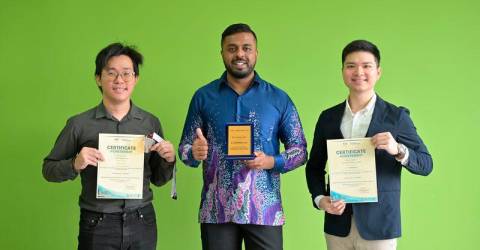Tunku Abdul Rahman University of Management and Technology (TAR UMT) continues to support, mentor and finance projects with commercial potential through its iSpark program.
This has resulted in TAR UMT staff, students and alumni, as well as members of the public, putting forward many promising ideas and innovations with high potential for commercialization.
One of iSpark's success stories was developed by a team of faculty and students led by Gunalaan Vasudevan, a lecturer in the Department of Construction Management in the Faculty of Built Environment.
The team invented the eco-friendly composite paving for sustainable development and the sustainable coconut shell concrete (CSC) for lightweight wall panels. Their inventions also earned them three awards at the International Innovation and Invention Competition through Exhibition (iCompEx) 2024.
Eco-friendly Interlocking Pave is designed to minimize the environmental impact of traditional paving materials by using recycled construction waste in its manufacture. This innovative approach reduces landfill contributions and the demand for new raw materials, promoting a circular economy in the construction industry.
Additionally, its modular design ensures less material wastage during installation while maintaining performance and aesthetics, making it a versatile and sustainable choice for modern construction projects.
Likewise those The sustainable “CSC for Lightweight Wall Panels” uses eco-friendly materials such as recycled industrial by-products and low-carbon cement alternatives to address environmental concerns. These panels not only reduce greenhouse gas emissions during production, but also improve insulation efficiency, resulting in energy savings in buildings over time.
This deliberate focus on sustainable materials and energy efficiency makes it a preferred option for environmentally conscious builders seeking innovative solutions.
Gunalaan has over the years applied his expertise in producing sustainable materials, some of which have won awards in competitions.
Another of his award-winning inventions that received recognition at the Borneo International Innovation and Invention Competition (BIIIC) 2024 is the palm kernel shell and coconut shell for concrete wall panels.
The production of coconut shell and palm kernel shell concrete typically requires less energy compared to traditional concrete, contributing to overall energy efficiency in the construction process.
“Coconut and palm kernel shells have natural heat-insulating properties and thus contribute to the overall energy efficiency of buildings. This can result in lower energy consumption for heating and cooling,” he said.
This project earned him and his team second place in the Technology category as well as the prestigious Gold Award for the panel review of the product and presentation.
Gunalaan also shared why it was important for him to work on inventing these sustainable products by saying, “The construction industry is one of the major industries that produces significant amounts of waste and this poses a challenge to the environment. “ That’s why we have focused on converting waste such as fly ash, recycled aggregates and other waste materials into something useful and sustainable.
“We recognized that if processed correctly, these materials could provide a viable alternative to traditional concrete, allowing us to produce functional and environmentally friendly blocks that align with the industry’s sustainability goals.”
He also emphasized the importance of working with small and medium-sized enterprises (SMEs) to bring these innovations to market.
“SMEs are the backbone of our economy and are often agile and open to adopting new technologies. We are confident that with the right partnerships, these products can be commercialized and have a significant impact on the industry.
For this reason, we have joined the iSpark program, where we have the opportunity to present these products to potential investors and SMEs capable of translating our innovations into actual production,” he concluded.
